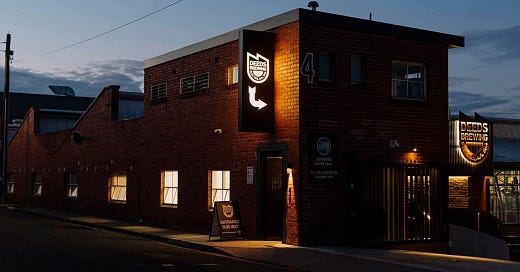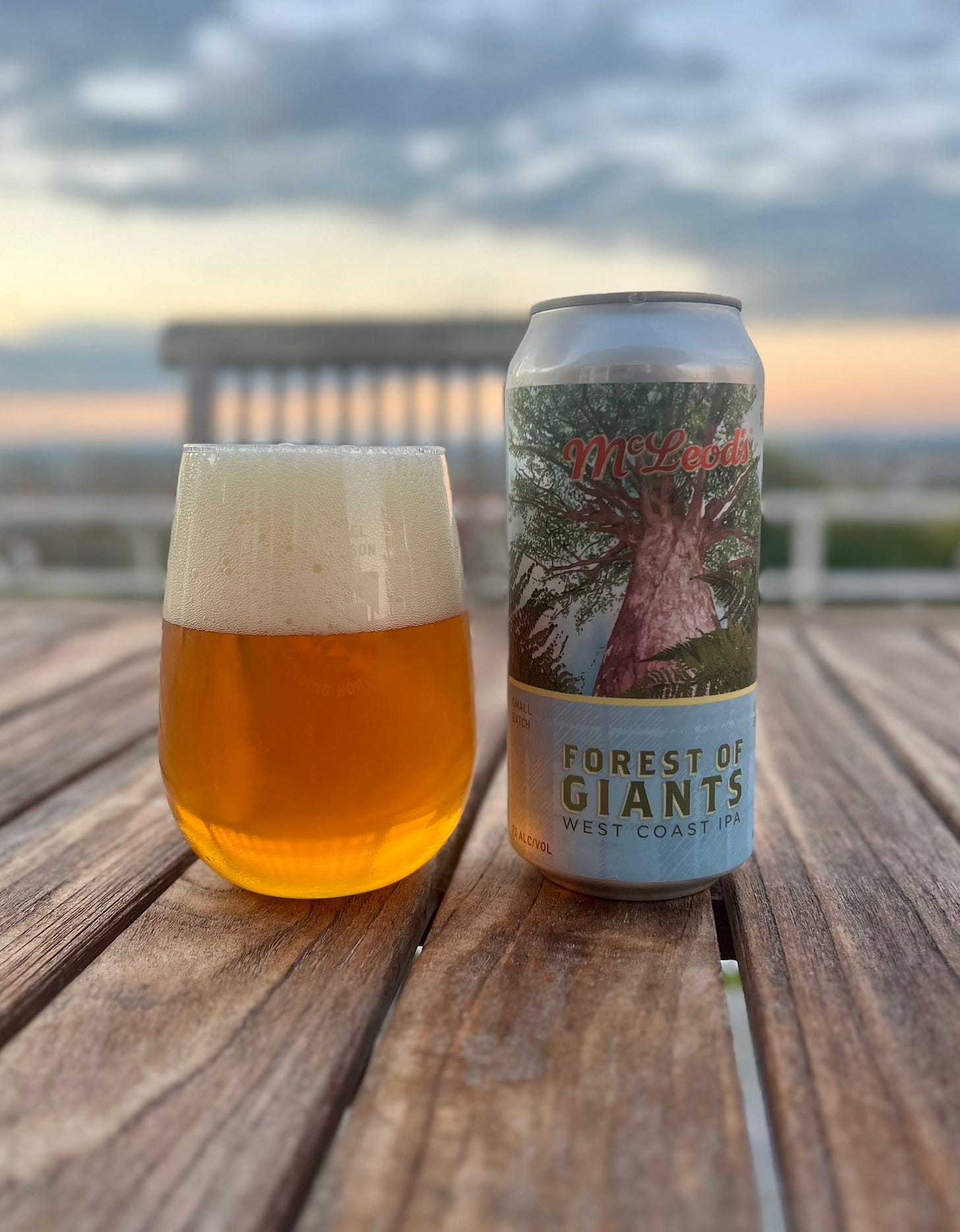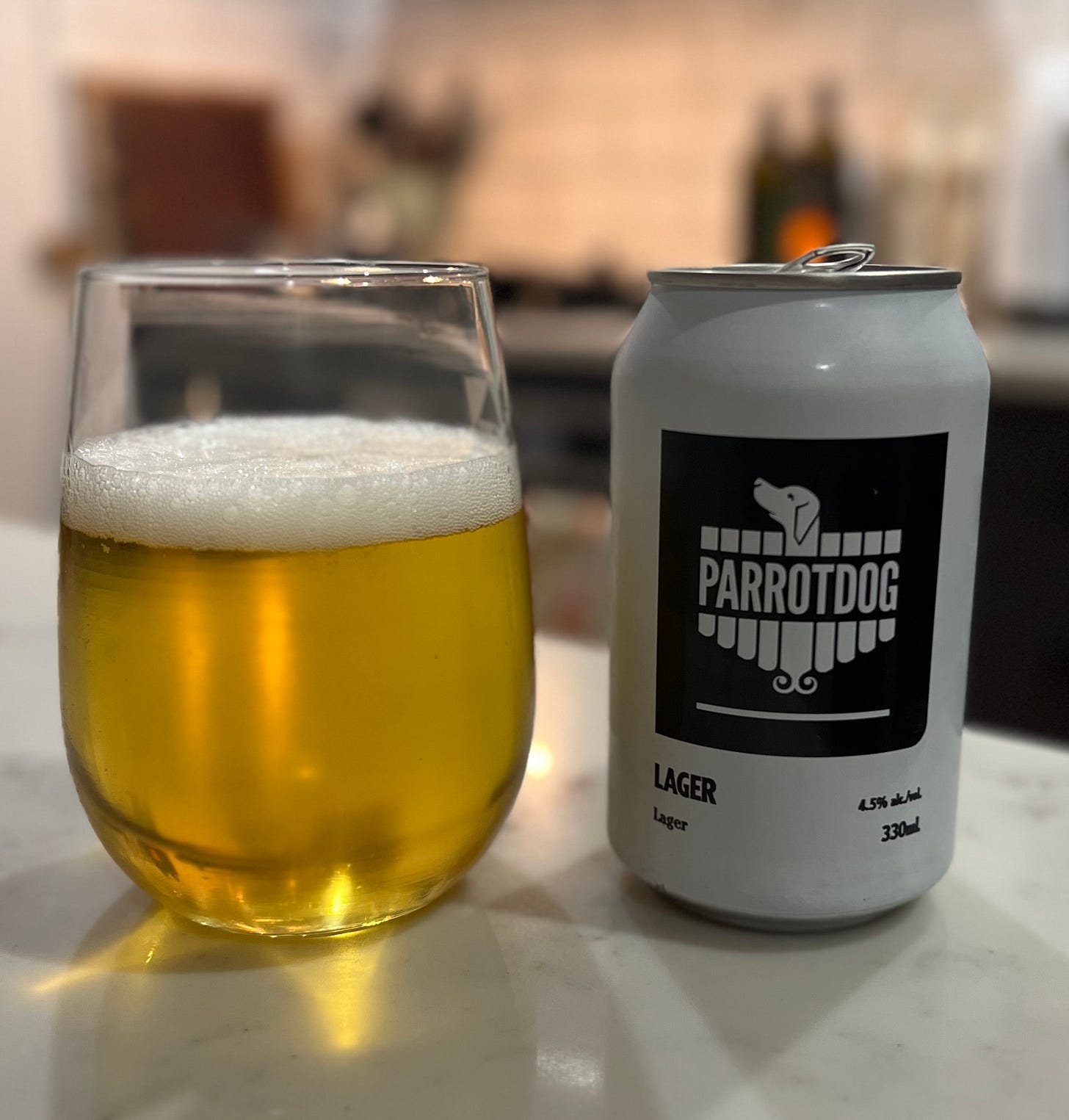Aussie brewery closures cut deeper
Cult beer gets added dose of Kiwi hops. Heineken rips up cider orchard. Why variety is no longer the spice of beer. Pete Brown looks back at James Watt's time at BrewDog.
Welcome to the latest dispatch from Friday Night Beers!
While I prefer not to start on a downer, it’s been another week of misery for Australian beer, with well-known, multi-award-winning Deeds Brewing to close and the ultra-crowdfunded Black Hops on the brink of liquidation.
I’ve said it a few times here, but the Aussie scene is bit different to New Zealand’s — they seem to have more threats in terms of the big breweries, and the “home brands” of supermarkets and liquor stores. Different rules around Covid payments/grants also come into play, it seems, with the Australian Tax Office quite dogged in its pursuit of anyone who missteps.
And their excise rate is higher, too.
In New Zealand we seem to have escaped some of the worst damage in the post-Covid, inflation-driven world … so far.
Deeds Brewing and its affiliated spirits brand Future Proof Distilling, are to cease operating following the appointment of Deloitte as voluntary administrators in March.
The brewery posted on social media, saying that since going into administration they had been searching for a buyer or investor to keep the business alive.
"[U]nfortunately, this hasn’t come to fruition," the post reads.
"Our hearts are broken. Since launching Deeds Brewing in 2012, our mission has always been about passion and people. We’ll deeply miss our dedicated staff, who have become like family to us, and our incredible fans who’ve stood by us through thick and thin throughout the years."
It's a sad end for the brewery, which started out as Quiet Deeds, and their staff who just 12 months ago were celebrating a triumphant night at the Australian International Beer Awards, where they picked up Best Specialty Flavoured Beer for their BBA Peanut Butter Imperial Stout, Best Specialty Beer for Ruminations, plus Champion Victorian Brewery and Champion Medium Australian Brewery. The closure comes just a week before the Australian International Beer Awards are announced at the Melbourne Showgrounds.
Meanwhile, Black Hops’ potential liquidation proves crowdfunding valuations are to be taken with a grain of malt.
The Gold Coast brewery is set to be placed into liquidation and its assets sold off, Business News Australia reported.
Administrators revealed the company could have been insolvent as far back as December 2022.
Black Hops collapsed on March 28 with debts of $A7.32 million, which is a huge loss given that they raised $A6.18 million from investors. What’s more the business was said to be worth $A65 million following a crowdfunding campaign in 2022 that raised $2.2 million in 24 hours.
The brewery cited mounting tax debts as the primary reason for its financial struggles.
Tony Sutherland, a director of Black Hops Brewing, described the closure as “an absolute tragedy.”
He added: “Just when things are turning around, we’ve got bureaucracies like the ATO [Australian Tax Office] come and take it away – it’s a tragedy.”
Beervana dates released
Beervana 2024 will be held at Sky Stadium in Wellington on August 23 & 24.
So here’s what you need to know:
Liquorland Pre-sale tickets will be live from 27 May - 2 June. Check out the Liquorland channels for the pre-sale code.
General Release tickets go on sale on 12 June.
Beer of the Week No 1
While writing this review for McLeod’s Forest of Giants, I noticed that the “sold out” sign had gone up on McLeod’s website. And not a surprise because this is a West Coast IPA to restore your faith in a style descriptor that’s often extended beyond what we understand WCIPA to be.
It’s robust, pine and grapefruit, resinous, a bit malty, veering towards bitter but the sweetness hanging on. But here’s the catch, or the trick of the brewer, this is not a WCIPA in the literal sense because, wait for it … it’s brewed entirely with New Zealand hops! Nelson Sauvin, Riwaka and Motueka. Admittedly those hops can give you all the required flavours but it’s more the norm these days that we see them used to express the sweeter, tropical downunder notes of NZIPA.
If you miss this but want a great IPA, also check out McLeod’s Good People IPA. More orange-lemon than grapefruit-pine but still with that robust character complemented by a smooth bitterness.
As one person said on Untappd: “Good People is a Good Beer from a Good Brewery. Good Job.”
While this is sold out on McLeod’s website I have seen it in New World, along with Good People. So, check out your local home of craft beer.
Cult beer gets added dose of Kiwi hops
Staying with Kiwi hops, the 20th edition of Russian River’s Pliny the Younger has just been released in Santa Rosa, California. And they’ve upped the dosage of New Zealand-grown Nectaron.
Maybe not a surprise given that Russian River brewer-owner Vinnie Cilurzo was in New Zealand for the recent hop harvest and had previously brewed a a Nectaron-hopped beer with hop breeding legend Ron Beatson.
The crew at Russian River posted to their website that this year’s Pliny the Younger is triple dry-hopped with Simcoe, Amarillo, Citra, Mosaic, Elixir, Nectaron, and Warrior.
“The beer itself is loaded with citrus, orange, stone fruit, nectarine, mango, and strong pine/resinous aromatics. We added a bit more Nectaron this year which is definitely noticeable with the orange/citrus/candied fruit. It is also slightly more bitter than 2023 contributing to a harmonic balance between aroma, flavor and mouthful. We hope you enjoy tasting this year’s Pliny the Younger!”
Tim’s Beer of the Week
Some beers are simply born for a fresh hop version, and Pacific Coast Tapawera Sunrise, a Double NZ Pilsner (6%) out of Mangawhai is one of them. Its dank and meandering herbaceous notes were primed for an injection of fresh hop magic to really make them come alive. The fresh hop on display here is Pacific Sunrise from Hop Revolution, a very rarely planted variety that has only recently begun to gain more interest. Gentle aromas of pine, rockmelon and mango lead the nose, with a deeply green and resinous undertow of fresh herbal character. Mellow and juicy on the palate, with a gentle bitterness and a surprising note of mixed red berries right on the finish. Remarkably elegant and gentle for a strong pilsner. — Tim Newman
BrewDog’s James Watt steps down
James Watt, the controversial co-founder and chief executive of BrewDog, is to step down after 17 years at the helm of the Scottish brewer and bar chain.
Watt, who navigated the brewery’s meteoric rise from “punk” challenger to mainstream beer brand, informed the board last year of his plan to step back, The Guardian reported.
He will be replaced by the company’s chief operating officer, James Arrow, who is expected to focus on returning the loss-making company to profit. Watt still owns 21% of the business and will hold the newly created title “captain and co-founder”, as well as remaining a non-executive director and continuing to advise on strategy.
His departure comes after several controversies over the group’s treatment of staff that have complicated its long-held ambition of floating on the stock market.
In 2021, Watt was accused by former workers in an open letter of presiding over a “culture of fear” within the business, with “toxic attitudes” towards junior staff. He apologised to staff and has said the group made changes after the open letter was published.
As legendary writer Pete Brown points out in a fantastic piece, there were two sides to Watt — the man and the character he played.
Looking back at James Watt's time at BrewDog (morningadvertiser.co.uk)
Dusty’s Beer of the Week
Jabberwocky Ruby Island is a 6.2% Red IPA straight outta Wanaka Beerworks. Rich, malty, toffee, caramel notes meet citrus and fleeting pine initially, followed by bready apricot hits on a chewy mouthfeel and a juicy finish. Tasty autumnal drinking right here. Hoppy Friday!
A look inside Canyon
I stumbled across this little video about Canyon Brewing online this week. It’s from Destination Queenstown as part of a series called From The Ground Up.
We’ve seen recent farm-to-brewery success with nearby Royalburn Station growing their own barley for Swifty, the collab beer they’ve done with Garage Project.
Canyon are also working on developing their own barley crop. They’ve had a few teething problems, one of them being soil that’s too nutrient-rich.
Marketing manager Mikaela Turner recently told me that this year, after tweaking processes and trying different off-season crops, they hoped to harvest 20 tonnes for processing at Gladfield Malt.
Beer of the week No 2
If Forest of Giants (above) showcases what’s new about West Coast IPA, it’s worth remembering some WCIPA heritage. I read some commentary on social media recently, centred on the opinion Liberty Brewing had fallen off the pace because they don’t release a new beer every week. My response is, why would you release a new beer when you have Knife Party! I have a feeling I reviewed this last year but what the heck, it’s still bloody good and whenever I have it, I tell myself I must have it more often. Big, bold, beautifully put together with juicy-bitter hops in abundance.
Cider orchard ripped up by Heineken
Heineken, which owns the Strongbow and Bulmers cider brands, has destroyed a 300-acre orchard, blaming the move on the slowing demand for cider.
The alcohol giant is looking to sell the orchard, located in Monmouthshire, prompted by a slower cider market and improved growing practices, the BBC reported.
Thousands of trees, planted in 1997, were chopped down in the process, which has seen environmentalists express wildlife concerns.
However, Heineken has said that it acted “in line with the Wildlife Act” and that it was “incredibly important that we act responsibly and sustainably at all times”.
My friend and cider expert Gabe Cook — aka The Ciderologist — has a great take on the story here:
Patagonia gets into brewing
The food and drinks arm of outdoor brand Patagonia (who knew they had a food and drinks arm?) has partnered with Fieldwork Brewing to brew a regeneratively-grown organic lager.
The 5.2% lager, named Kernza Lager, has been brewed by the California-based brewery with organic hops, organic barley, and regeneratively-grown organic Kernza grains.
The union is part of the two companies pushing for a movement to scale regenerative and organic ingredients that improve soil health, restore ecosystems and help fight the climate crisis.
According to the companies, Kernza is a deeply-rooted regenerative perennial grain and has the potential to transform the brewing industry. Not only does Kernza allegedly stabilise soil and requires minimal tilling but it also purportedly increases soil organic matter and improves soil structure and water-holding capacity.
Patagonia is confident that ongoing research will confirm that Kernza draws down and stores more carbon in the soil than annual grains.
Beer of the Week No 3
I don’t usually review beers that are 18 months old — we try to stay fresh and new here! And when I say 18 months old, this had a best before of around Christmas last year. Why am I reviewing it? Because it was bloody amazing! As I noted the other week, I recently moved house. And that meant taking stock of the beer scattered around the place. This has been chilled the whole time I’ve had it (over a year … I got it in April last year) and it hasn’t skipped a beat. Full on Green Bullet hop experience.
Variety no longer the spice of beer
I’ve touched on this before — the idea that too much variety is one of the things killing craft beer.
Here’s some short excerpts from the longer story, linked below.
Reliability and availability are becoming important metrics, especially as customers grow more hesitant to spend money on unproven beer. “We’ve seen a shift back into a safety net,” said Matt Drummond, the client solutions manager for market research firm NIQ. “People want to know what they’re going to get when they buy a beer.”
“The marketplace has pretty unanimously decided that it doesn’t need more variety,” said Zack Kinney, a founder of Kings County Brewers Collective (KCBC) in Brooklyn. KCBC cut around 20% of its SKUs last year and will eliminate a similar amount this year. “Not all ideas and experimentation are worthy of a long life,” Kinney added.
Distributors are helping steer this less-is-more approach. During its annual business-planning meetings, Vacationland Distributors, which covers New Hampshire and Maine, advised breweries to focus on three to five stable, always-available SKUs, that can be sold at chain accounts like grocery stores. “We’re preaching back to basics,” says co-owner and vice president John Squadrito. Part of this is a reaction to slowing sales of one-off and collaboration beers. “People want those core SKUs to rely on, whether it’s on tap or on store shelves.”
The New Economics of Craft Beer | SevenFifty Daily
That’s us for another week, catch you next time.














